So you’re thinking about getting an aquarium but aren’t entirely sure what the upkeep looks like?
In general, freshwater aquariums are not that difficult to maintain, although there are several things you should keep in mind to maintain the healthy quality of the water for your freshwater fish. Saltwater aquariums are more work to maintain, but the beautiful ecosystem you’ll create will be worth it.
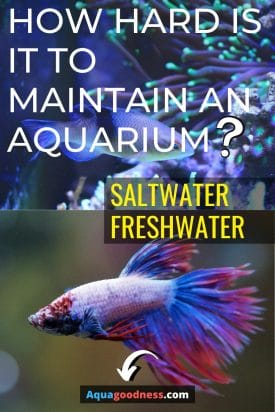
Table of Contents
How Hard is It to Maintain a Freshwater Aquarium
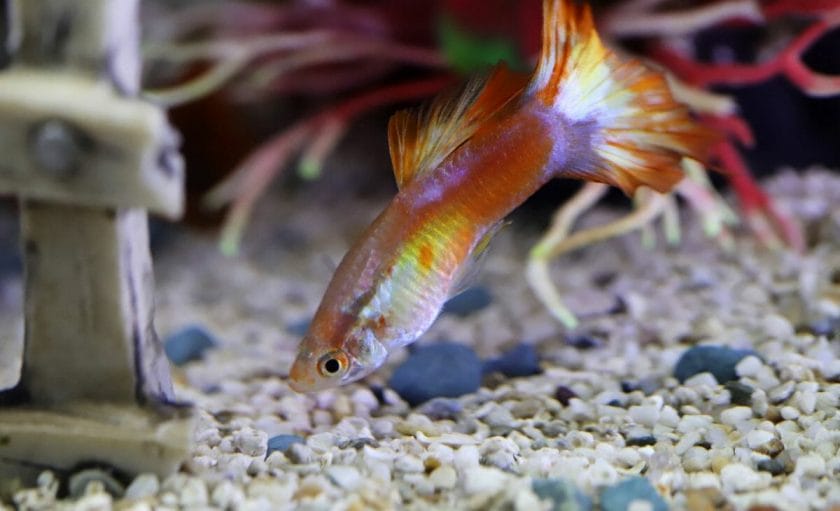
Many people might be put off from getting a fish tank because they may be intimidated by how much work it takes to take care of it.
But generally, a freshwater fish tank doesn’t require extensive upkeep. What’s mostly required in order to take care of a freshwater tank is research, commitment, and patience.
So what do you need to keep in mind when setting up a freshwater aquarium?
Choose the Right Fish Tank Size for the Species of Fish
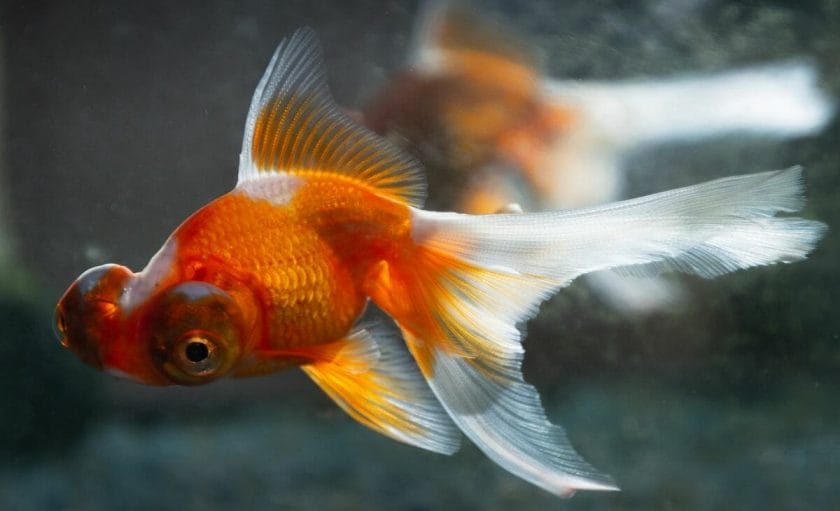
You want to make sure that when choosing an aquarium, you’re getting a tank that is going to be compatible with the species of fish you’re getting as well as the quantity of fish you’re looking to have.
This is extremely important for the fish’s health, as putting a big fish in a small tank or too many fish in a tank can affect the water’s oxygen level, lead to excess waste, or even fish fatalities.
For example, if you’re looking to get a betta fish, you’re likely not going to need a 20-gallon tank. It’s just not necessary for this especially aggressive, solitary fish.
A tank that is around 5 gallons will be more than enough for an average betta fish.
However, if you’re looking to get 7 or 8 goldfish, most experts would recommend a standard 20-gallon fish tank or bigger in order to ensure healthy oxygen levels and water quality.
If you’re unsure of what size of tank to get for your fish, you can look on the internet for appropriate tank sizes for the species and quantity of fish you’re looking to get.
If you still can’t find the answers you’re looking for, you can always ask a representative at your local pet store. They will likely have some expertise in aquarium maintenance and can put you in the right direction to having the healthiest fish tank possible.
Live Aquarium Plants: Benefits and How to Choose Them
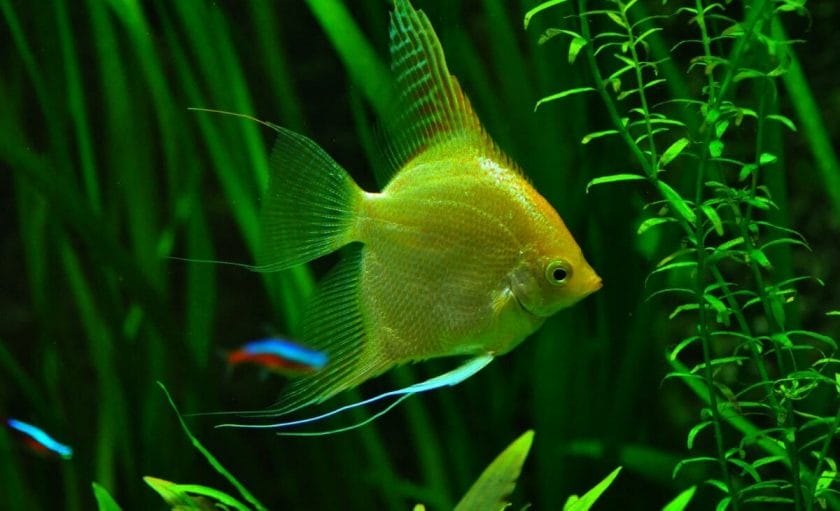
When getting a fish tank, you may want to consider adding additional items such as plants in order to help with the aquarium’s water quality or just to add a nice touch of flair to an otherwise banal tank landscape.
When considering getting a plant for your aquarium, you should always look to purchase plants that look live and healthy. Plants that look old with spots that are yellow or rotting will only bring down the quality of your fish tank.
Many aquarium plants are fairly simple to take care of with very little maintenance required. Other plants may sometimes need more upkeep than others, with some aquarium plants requiring additional CO2 to be put into the water and special lamps to help keep them alive.
You should always make sure that the plant requirements are compatible with the species of fish you have to make as seamless of an environment as possible.
Time Commitment Required for Maintaining a Freshwater Aquarium
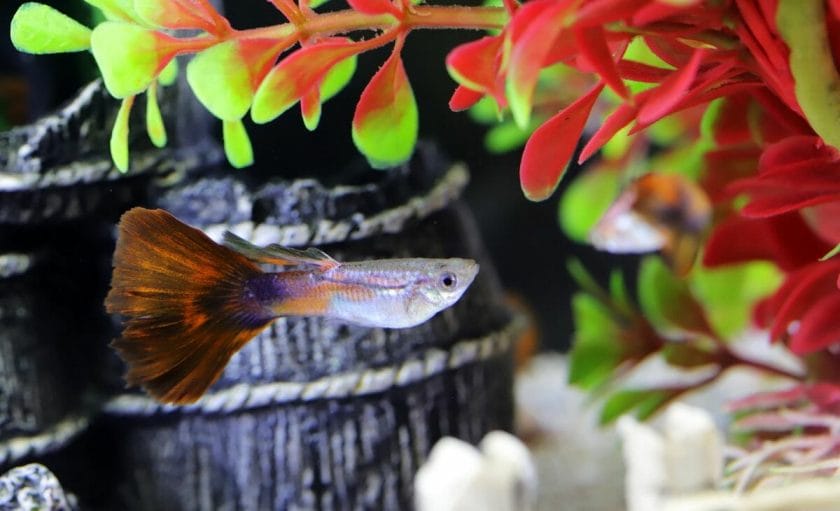
When you own a freshwater aquarium, you should implement a consistent maintenance schedule to ensure the health of your fish, tank water, as well as any filtration systems you may have in the aquarium.
When it comes to daily maintenance, you should make sure that your filtration systems are running properly as well as make sure that your fish are sufficiently fed for the day.
If you have newer fish, this is a great time to observe how much they eat when you feed them. If you notice that after feeding, there are still residual bits of food floating around, consider feeding your fish less food to prevent build-up at the bottom of the tank.
How often you perform the more intricate maintenance an aquarium requires varies by source, but most fish experts agree that you should keep to a weekly, or bi-weekly maintenance routine to make for the highest level of tank health.
Weekly or bi-weekly maintenance for a freshwater aquarium often includes:
- Testing the tank water for nitrate levels, nitrite levels, and pH balances
- Replacing 10%-15% of the tank’s water with fresh water (If you’re using tap water make sure to dechlorinate water before adding it to the tank)
- Cleaning your aquarium walls weekly to prevent algae and dirt buildup.
Monthly maintenance for your aquarium should involve:
- Cleaning and/or replacing the water filter
- Vacuuming up any excess debris on the tank floor
- Cleaning out all tubes and heaters to prevent buildup that could potentially affect the system’s flow of oxygen or pH levels.
Pro Tips for Maintaining a Freshwater Aquarium
- Choose the right tank size for your fish
- Avoid overfeeding your fish
- Cycle the tank before adding your fish
- Perform routine maintenance on your tank
How Hard is it to Maintain a Saltwater Aquarium
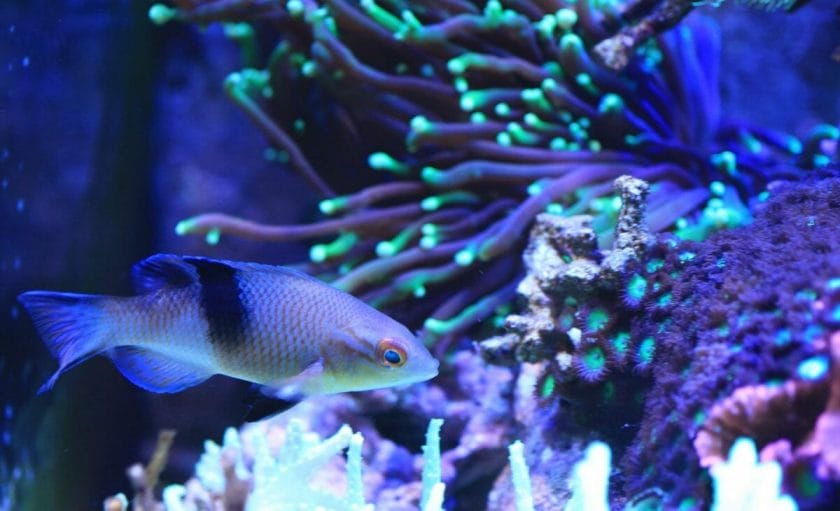
Taking care of a saltwater aquarium will oftentimes require a bit more diligence and resources on your part to maintain, as they tend to be more expensive than freshwater aquariums.
Although there are extra steps in maintaining saltwater aquariums, there are many similarities in upkeep with freshwater aquariums.
In maintaining a saltwater aquarium, you can follow many of the standard practices that a freshwater aquarium requires, save a few key differences.
Choose the right fish tank size for the species of fish
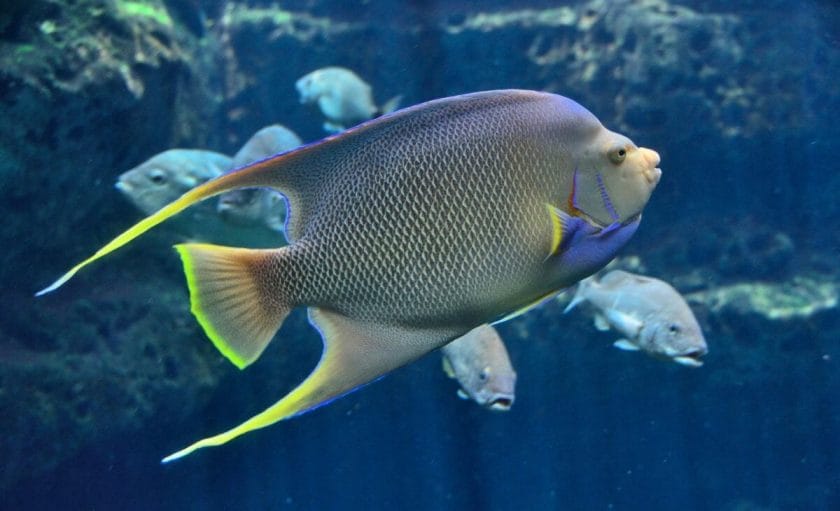
Just like with freshwater aquariums, the size of your saltwater aquarium will be contingent on what species of fish you’re planning to get, and how many.
If you plan on getting beginner-friendly saltwater fish such as clown fish or lawnmower blennies, you must get a tank that is no smaller than 30 gallons. You’ll rarely come across a saltwater fish that doesn’t require at least 20 gallons of water.
You should never keep a single fish in a tank you would keep a betta fish in. They are from two different worlds entirely and have different requirements for a good quality of life.
Saltwater Aquarium Plant Benefits
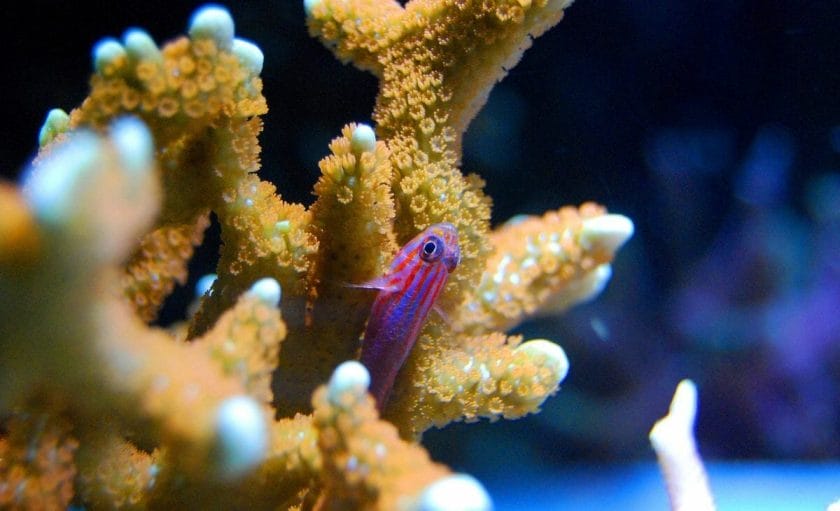
Having saltwater plants in your aquarium can help assist in maintaining the health of the environment your marine fish will be living in.
Just like with freshwater aquarium plants, saltwater aquarium plants can help to filter out nitrates and carbon dioxide while contributing to healthy water conditions for your marine fish.
Adding saltwater plants to your aquarium will help in making the environment look more natural for the fish that are living in the tank, as well as being a healthy snack for the fish to nibble on in between feedings.
Time Commitment Required for Maintaining a Saltwater Aquarium
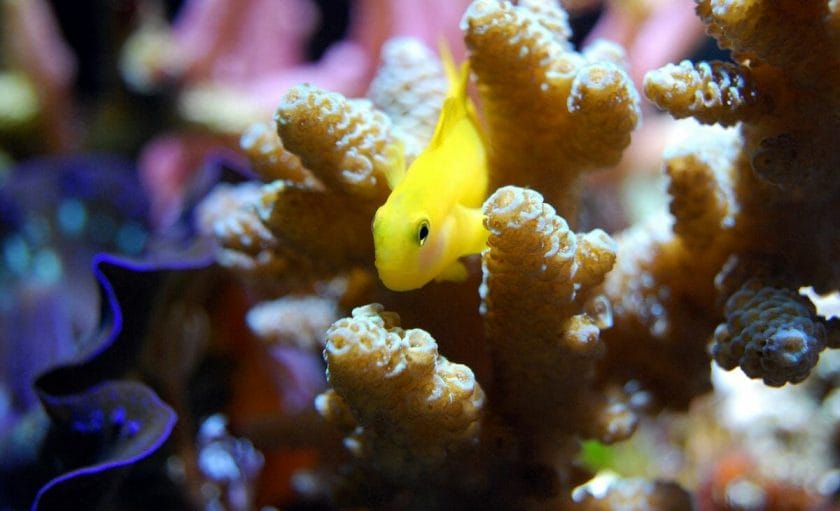
In terms of daily, weekly, and monthly maintenance, a saltwater aquarium doesn’t stray too far from the maintenance needs of a freshwater aquarium.
Just like a freshwater aquarium, a saltwater aquarium is going to require a consistent maintenance schedule to measure salinity, temperature, and pH.
One thing that is different about saltwater aquariums from freshwater aquariums is the speed at which the tank water will evaporate.
When you have a saltwater tank, you’re going to have to top off your saltwater aquarium daily, as saltwater has a tendency to evaporate more rapidly than freshwater.
To do this, you can collect salt water from the ocean. However, if you do this, you must sterilize the water under a UV light for at least 24 hours to kill any pathogens that may harm the fish.
You can also create your own salt water. You can use fresh water, well water, or reverse osmosis water to create your own saltwater solution.
Pet stores that sell saltwater fish will typically have salt solutions so that you can make your own saltwater at home. DO NOT use table salt to make your saltwater solution.
Pro Tips for Maintaining Saltwater Aquarium
- DO NOT impulse buy saltwater fish
- Check salinity levels DAILY
- Change water weekly
- Be patient
FAQ
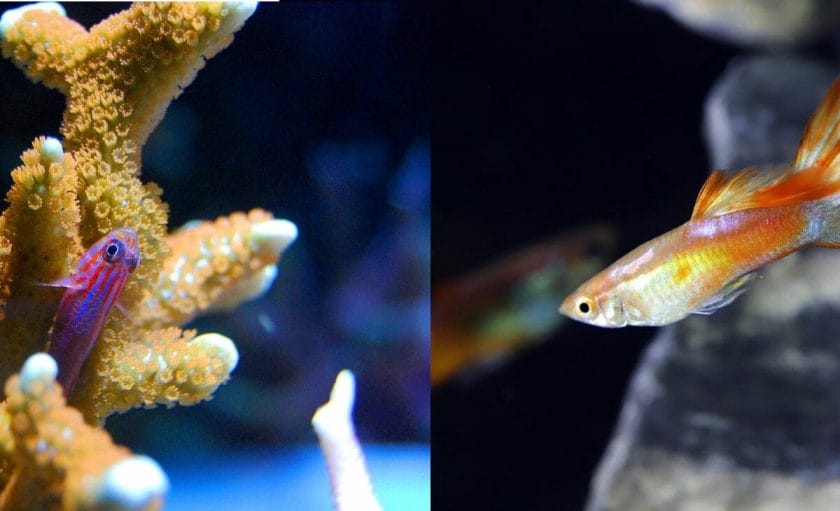
Which is harder to maintain? A freshwater aquarium or a saltwater aquarium?
A saltwater aquarium is going to be more arduous and expensive to maintain than a freshwater aquarium. On top of the more demanding maintenance routine a saltwater aquarium requires, there are also other equipment requirements such as protein skimmers, saltwater testing kits, powerheads, and a much stronger filter than an average freshwater filter.
Can beginners own saltwater aquariums?
Yes! There are plenty of beginner-friendly saltwater fish such as clownfish, firefish, angelfish, and cardinal fish. Just be aware that you will still have to be twice as diligent in taking care of your saltwater fish than if you were to start out with a freshwater aquarium.
How do I keep my fish healthy?
Keeping to a consistent maintenance routine and feeding schedule is going to ensure the health of your fish as well as the overall ecosystem of your aquarium. If you feel a fish is sick, ask a local pet store representative for signs to look out for.
Conclusion
If you’re a beginner looking to get an aquarium, the easiest thing for you to do would be to get a standard freshwater aquarium. They are less maintenance and less expensive to upkeep than a saltwater aquarium
For those fish-keeping hobbyists who are more advanced or have more time and resources on their hands, a saltwater aquarium can provide a nice challenge in maintaining a unique and beautiful ecosystem for marine life.
To increase your chances of success with your first aquarium, keep in mind the pro tips I’ve provided for both freshwater and saltwater aquariums.
Happy Fishkeeping!